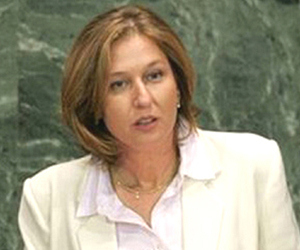Tzipi Livni: striving to be Israel's second female premier
 Jerusalem - She was elected by Time Magazine as one of the 100 most influential people in the world.
Jerusalem - She was elected by Time Magazine as one of the 100 most influential people in the world.
Now she wants to become the most powerful woman in Israel since Golda Meir was prime minister in 1969-74.
Israeli Foreign Minister Tzipi Livni, 50, is the favourite candidate to win Wednesday's primaries in the ruling Kadima party of Prime Minister Ehud Olmert.
A centrist who has come to believe passionately in a two-state solution to the Israeli-Palestinian conflict, and who can be placed to the left of her more hawkish rival candidate Shaul Mofaz, she is however no ultra-dove.
Like many who joined Kadima from the hardline Likud party, Livni comes from a right-wing background and started out as champion of an Israeli state on all the land inhabited by Jews since Biblical times, including Judea and Samaria, or what is now known as the West Bank.
Although she has been Israel's chief negotiator in the revived peace talks with the Palestinians, her campaign does not focus on the negotiations, a strategy aimed at appealing to the mainstream and avoiding alienating the centre-right. Meeting foreign correspondents last month, she made no mention of Jerusalem or other sensitive bones of contention in the talks with the Palestinians.
Instead, she is running on an anti-corruption ticket. Called "Ms Clean" by some, Livni's political track record is relatively short, but practically spotless. As such she represents the antithesis of Olmert, who agreed to resign from the premiership and allow his party elect a new leader because of a host of corruption allegations.
The Tel Aviv-born mother of two, a lawyer by profession, became Israel's second-ever female foreign minister in January 2006, little more than five years after making her debut in national politics.
She was first elected to the Knesset in June 1999 for the Likud, the party Sharon abandoned to form the centrist Kadima. Her rise has since been meteoric. A Sharon protege, she first entered the cabinet when he formed his first government in early 2001, and has since held a host of ministerial portfolios.
Despite her slightly higher ratings, she stepped aside and let Olmert, Sharon's number two, take over when the popular premier had a stroke and became incapacitated just three months before the March 2006 elections that brought Kadima to power.
Since then, relations between the premier and his foreign minister have soured, especially after she publicly called on Olmert to resign over his widely criticized handling of the summer 2006 second Lebanon war and the corruption suspicions against him.
Some critics say she is a sphinx, liked by many not because they know who she is, but because they do not know who she is. Both the Israeli dailies Ha'aretz and The Jerusalem Post have separately called this "the Livni paradox."
Critics also say she at times appears cold and shows no emotion, while supporters stress her integrity, authenticity and her analytical and decision-making abilities.
Livni, who spent four years as an agent for the Israeli Mossad intelligence agency from the young age of 22, comes from a fiercely nationalist, ideological home. Her father, Eitan Livni, was a known legislator for the precursor of the right-wing Likud party and a leader of the Irgun, a militant Jewish underground organization in pre-Israel, British-ruled Palestine.
In an interview with The New York Times in June, she said she was raised on two key values, which she later found contradictory - "that the whole (Biblical) land of Israel was our heritage," and "the need to respect others, not to control others' lives."
"I got to my own conclusion, that there is a need to divide the land," she said. "I still believe in our right to the whole land, but felt it was more important to make a compromise."
She calls herself a pragmatic. On a personal note, she says she she prefers jeans to a suit and sneakers to high heels, and has been a vegetarian since age 12.
Professionally, she is respected by the foreign diplomatic corps.
In an article accompanying Livni's entry in The Time 100 list, US Secretary of State Condoleezza Rice spoke of her Israeli counterpart as a friend with whom she had "sat together for hours debating ideas freely, openly, even combatively at times."
Livni, wrote Rice, was a "woman of peace." (dpa)